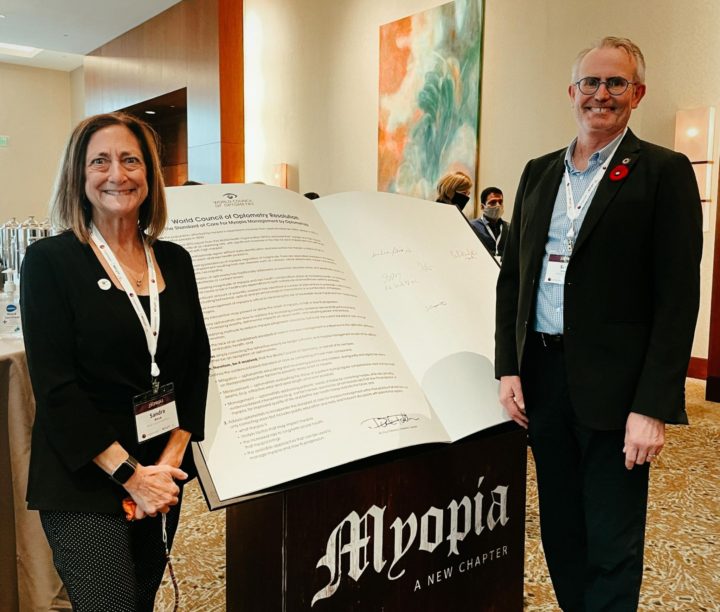WCO Myopia Standard of Care Resolution Pledge Form
 Please join us by reading the resolution below and pledging as an individual or organization to uphold this standard of care.
Please join us by reading the resolution below and pledging as an individual or organization to uphold this standard of care.
To read the resolution in Arabic, click here.
To read the resolution in Danish, click here.
To read the resolution in UK English, click here.
To read the resolution in US English, click here.
To read the resolution in French, click here.
To read the resolution in Spanish, click here.
To read the resolution in Swedish, click here.
To read the resolution in Russian, click here.
The Standard of Care For Myopia Management by Optometrists
Whereas the population affected by myopia is expected to increase from approximately two billion people in 2010 to nearly five billion people in 2050;
Whereas a seminal 2015 report from the World Health Organization (WHO) declared that “myopia and high myopia are increasing globally at an alarming rate, with significant increases in the risks for vision impairment from pathologic conditions associated with high myopia”;
Whereas eye care professionals agree without early identification and intervention for myopia a child is at risk for developing long term vision and eye health problems;
Whereas with increasing prevalence of myopia, regardless of magnitude, there are associated increases in the lifetime risk of further visual impairment resulting from eye diseases such as cataract, retinal detachment, myopic maculopathy, glaucoma, and optic neuropathy;
Whereas the profession of optometry has traditionally addressed uncorrected refractive errors, and specifically myopia, by correcting with spectacles or contact lenses;
Whereas the increasing magnitude of myopia and eye health complications place an increasing burden on individual quality of life and cause a rise in healthcare expenditure to both individuals and healthcare systems worldwide;
Whereas a significant amount of scientific research has identified a number of interventions to potentially control myopic progression, including behavioral, optical and pharmacological interventions or a combination of therapies;
Whereas active management of myopia is critical to minimizing the risk of irreversible visual impairment from myopia-related ocular pathologies;
Whereas early intervention may prevent or delay the onset of myopia, or halt or slow its progression;
Whereas many optometrists are slow to address the increasing scientific evidence demonstrating the increasing prevalence, increasing severity, detrimental impacts on visual health, and adopting proven interventions;
Whereas applying methods to reduce myopia progression should be, but is not, the current standard of care amongst many optometrists;
Whereas the lack of an established standard of care in myopia management is a disservice to the optometric profession, patients, and public health; and
Whereas simply correcting the refractive error is no longer sufficient, and myopia management should not be optional, and rather be an obligation of optometrists;
Now, therefore, be it resolved, that the World Council of Optometry, on behalf of its members:
- Defines the evidence-based standard of care as comprising of three main components:
- Mitigation — optometrists educating and counseling parents and children, during early and regular eye exams, on lifestyle/dietary/other factors to prevent/ delay onset of myopia
- Measurement — optometrists evaluating the status of a patient during regular comprehensive vision and eye health exams, (e.g. refractive error and axial length whenever possible)
- Management — optometrists addressing patients’ needs of today by correcting myopia, while also providing evidence-based interventions (e.g., contact lenses, spectacles, pharmaceuticals) that slow the progression of myopia, for improved quality of life and better eye health today and into the future; and
- Advises optometrists to incorporate the standard of care for myopia management within their practice that shifts from not only correcting vision but includes public education and early and frequent discussions with parents that explains:
- what myopia is
- lifestyle factors that may impact myopia
- the increased risks to long-term ocular health that myopia brings
- the available approaches that can be used to manage myopia and slow its

